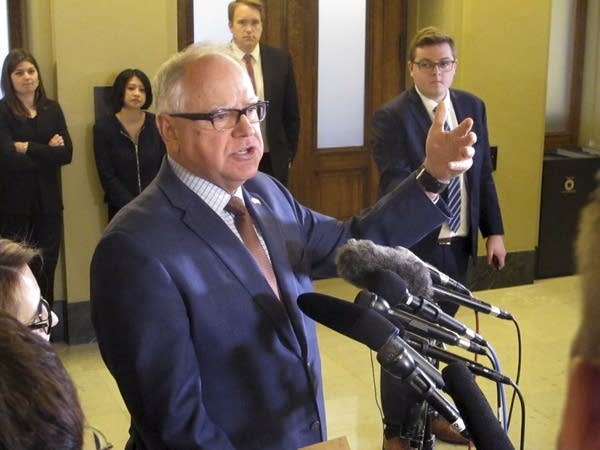Minnesota lawmakers have one week left -- and a lot to do

Go Deeper.
Create an account or log in to save stories.
Like this?
Thanks for liking this story! We have added it to a list of your favorite stories.
Updated 11:35 a.m. | Posted 7:53 a.m.
Minnesota lawmakers are again racing the clock and scrambling for a budget deal with a week to go in the 2019 session.
High-level negotiations involving first-term DFL Gov. Tim Walz, a Democratic-led House and a Republican-dominated Senate have so far failed to produce agreement on how much the state should spend and on what over the next two years. Talks were to resume Monday morning.
Turn Up Your Support
MPR News helps you turn down the noise and build shared understanding. Turn up your support for this public resource and keep trusted journalism accessible to all.
After a fruitless meeting Sunday night, Walz voiced frustration with the lack of progress.
"I'm still hearing that there's red lines on things that we can't do," Walz said after a short negotiation session where he was hoping Senate Republicans would present a new offer. "So yeah my frustration level is growing."
Senate Majority Leader Paul Gazelka said Monday that he was prepared to make new offers but insisted there was plenty of existing money coming into the state and in reserve accounts.
Gazelka, R-Nisswa, said time is running short for small steps given the yawning gap between the sides.
"We think that to get done on time those targets need to be set no later than Wednesday morning," Gazelka said. "Today is when we expect some movement."
He came to the meeting with a presentation intended to buttress the GOP argument that taxes are too high and shouldn't go up.
Walz and majority House Democrats say Minnesotans support what the proposed tax increases would pay for — education, health care and road work.
The sides are about $2 billion apart in their budget plans.
If there's not a grand bargain in the next couple of days, it will be difficult for the Legislature to finish on time.
That would be a letdown for leaders and a governor who pledged this time wouldn't end that way.
But it would fit with an unfortunate trend. Three of the last four budget-setting sessions have required a special session to seal the deal. And since 2001, there have been seven special sessions tied to tardy budget bills.
In some years, the Legislature has gone almost immediately into overtime merely to ratify an agreement that was struck prior to the adjournment deadline.
Where it gets dicey is if there is no prior compromise. In that scenario, it could push the standoff into June and begin another flirtation with a government shutdown come July.



